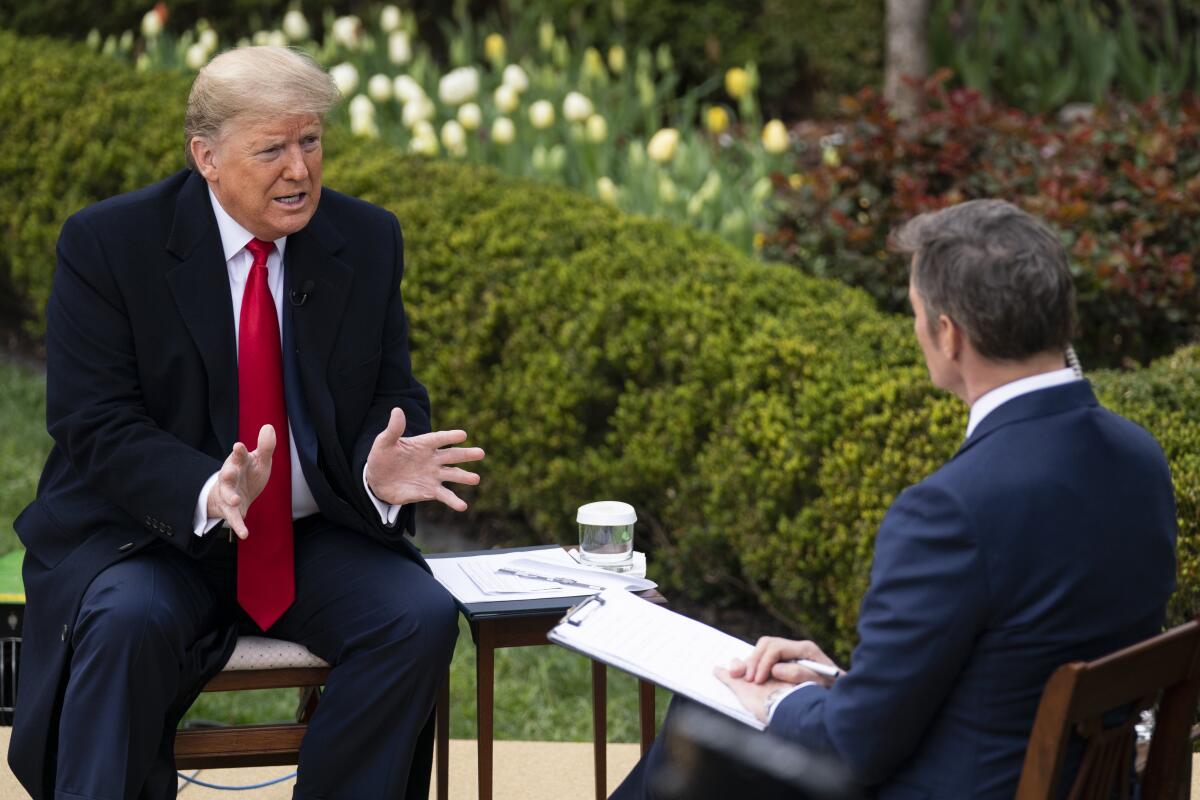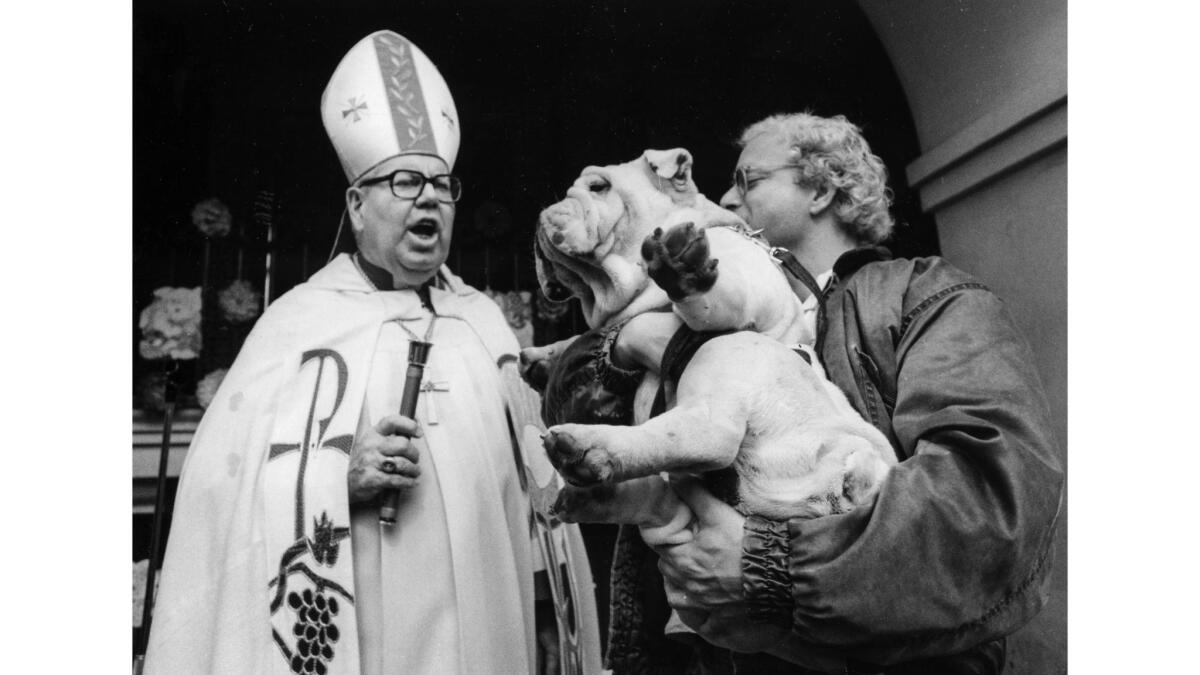Newsletter: Deaths and dollars

- Share via
President Trump’s push to ease coronavirus restrictions quickly sparks a grim debate.
TOP STORIES
Deaths and Dollars
Senate Democrats and the White House agreed late Tuesday night to a nearly $2-trillion stimulus package to combat the economic fallout of the coronavirus outbreak, including direct payments to most Americans and a half-trillion-dollar fund to shore up struggling companies.
But even as the final details of that package were haggled over, President Trump and some of the nation’s most prominent governors of both parties were engaging in a grim debate of sorts: how much death they’re willing to risk to get the economy running again.
Public health experts warn that they don’t yet know whether the United States is succeeding in slowing the spread of the virus by shutting down schools, shops and restaurants and telling millions of Americans to work from home. Trump, nonetheless, has repeatedly said this week that he wants to quickly ease restrictions.
“I’d love to have the country opened up and just raring to go by Easter,” the president said during an appearance on Fox News. The holiday would be a “beautiful time” to have “packed churches,” he later said, even though doctors have discouraged gathering in crowds. He also said that financial distress could lead “thousands” to commit suicide.
Texas Lt. Gov. Dan Patrick even went so far as to suggest that fellow seniors should risk their health for the sake of the economy.
“My mother is not expendable,” Andrew Cuomo, the Democratic governor of New York, tweeted in apparent response. “We will not put a dollar figure on human life.”
Ohio Gov. Mike DeWine, a Republican, also pushed back against Trump’s suggestion of a rapid return to normal.
But Trump is eager to find ways to boost the economy, which has stalled since the coronavirus began spreading across the country. The stock market remains wounded despite the Dow Jones industrial average having its best day since 1933 on Tuesday on news that an economic stimulus deal in Congress was within reach, and unemployment claims are surging.
How Silicon Valley Became an Epicenter
Authorities in Santa Clara County, where more than 2 million people live, were well aware the virus would arrive in the Silicon Valley, given the area’s status as the world’s high-tech capital and a hub for international travel. They tried to prepare — and became trailblazers for the social distancing requirements later adopted statewide.
So why did Silicon Valley become an early epicenter of contagion? It may take years for analysts to provide full answers, but Dr. Jeffrey V. Smith, Santa Clara’s executive officer, said the virus exploded in part because the county, in real time, was unable to track and trace its early spread.
According to Smith, the Trump administration had effectively put pandemic planning on hold, and his county and others were not getting the testing and training they wanted: ”In a very real way, it shows how our federal government has turned us into a third-world country.”
When It Rains, It Pours
For more than six years, through two governors and hundreds of lawmakers’ votes, California’s state government slowly built the largest rainy-day fund in its history — a cash reserve projected to total $21 billion by next summer. But there are growing fears that the fast-moving crisis sparked by the coronavirus pandemic could force it to be spent in a matter of months.
A number of the state’s most experienced budget watchers now expect that California might need to use the entire cash surplus, and possibly much more money, to prop up vital government services that could be severely underfunded by a quickly collapsing economy.
A Big Help and Big Brother?
One of the most effective ways authorities can limit the spread of a pandemic is to immediately locate, test and isolate anyone who’s had contact with a carrier of the disease. But pinpointing those contacts is painstaking, and an infected person can’t reliably remember all of them.
With that in mind, Singapore’s government has introduced an app that will alert users if they’ve been in close proximity with a confirmed case of the coronavirus. But it also raises complicated privacy questions, as governments around the world have delved deeper into their citizens’ lives.
More Top Coronavirus Stories
— Coronavirus tests remain scarce, and even among those who get them, patients are dying before their results even arrive, including a 39-year-old social worker.
— A second crisis is brewing in primary care physicians’ offices nationwide, threatening to push the nation’s healthcare system further to the brink. These doctors have seen a big uptick in telehealth visits — a move widely hailed by public health experts — but the fees for these services are lower.
— After delaying their decision, the International Olympic Committee and the Japanese government have postponed the 2020 Tokyo Games. A new date has not been set, but they will take place no later than the summer of 2021.
— For victims of domestic abuse, stay-at-home mandates, job losses and school closures are “kind of a worst-case scenario.”
— Joe Biden found his footing as a presidential candidate. Then coronavirus changed everything.
Plus, here are some tips on getting through the days ahead. For more, sign up for Coronavirus Today, a special edition of The Times’ Health and Science newsletter that will help you understand more about COVID-19. As with all our newsletters, it’s free:
— Be sure to practice social distancing, such as maintaining a 6-foot radius of personal space in public.
— Only wear a mask if circumstances warrant it; for instance, if you must be in very close contact with people in a public area.
— The restaurant industry has been devastated. If you’re having a tough time, here are some free resources that may help.
— Advice for helping kids navigate pandemic life includes being honest about uncertainties, acknowledging their feelings and sticking to a routine. Here’s guidance from the CDC.
Start your day right
Sign up for Essential California for the L.A. Times biggest news, features and recommendations in your inbox six days a week.
You may occasionally receive promotional content from the Los Angeles Times.
FROM THE ARCHIVES
Each spring, Angelenos have flocked to Olvera Street so their furry friends may be blessed by church leaders. The local pre-Easter Blessing of the Animals dates to 1930, but similar rituals around the world date back to the 4th century as a means for Christians to honor the animals that serve and comfort them. Sometimes those non-human friends are cuddly, like dogs, cats and bunnies. Others are less so, like turtles and cows. The event is usually held in late March or early April, but this year it has been postponed because of the coronavirus outbreak.

CALIFORNIA
— A teenager who lived in Lancaster may be the first minor in the U.S. to have died from the coronavirus, but confirming that will require additional testing.
— Citing danger from the coronavirus, the Los Angeles Archdiocese says it is closing all its churches until further notice.
— The L.A. County sheriff says gun stores must close or be cited amid coronavirus restrictions. Officials say the stores don’t count as essential businesses.
— Before social distancing measures went into effect, guests at a Trump National Golf Club disco party for a former mayor got the coronavirus.
Enjoying this newsletter?
Subscribe to the Los Angeles Times.
HOLLYWOOD AND THE ARTS
— Terrence McNally has died of coronavirus-related complications at 81. His long, varied and prolific career as a playwright, musical librettist and screenwriter earned him four Tony Awards and an Emmy. Our theater critic looks at how McNally used laughter to lift us past loneliness and loss.
— Upright Citizens Brigade suddenly laid off dozens of staff members via email. Former employees aren’t just angry — they’re doubtful the group’s leaders can handle the recovery.
— The pandemic prevented in-person meetings, but the Writers Guild of America is still trying to reach an extension of its contract with film and television studios.
— Marge knows best. How “The Simpsons” inspires one L.A. mom in quarantine.
NATION-WORLD
— Prince Charles, the heir to the British throne, has tested positive for the coronavirus.
— The Trump administration is slashing $1 billion in assistance to Afghanistan and threatening further reductions after the country’s rival leaders failed to agree on forming a new government.
— With a “virus at Iran’s gates,” the country has struggled to contain the spread. Citizens ignore warnings, control measures fall short, and the consequences grow deadlier by the day.
— Fearing a new round of coronavirus cases, mask-wearing Hong Kong wants barefaced foreigners to stay away.
— India will begin the world’s largest lockdown today as it tries to stop the spread of the coronavirus, Prime Minister Narendra Modi announced.
— Malaysia’s medical glove factories, which make most of the world’s critical hand protection, are operating at half capacity just when they’re most needed, the Associated Press has learned.
BUSINESS
— Health or a paycheck? Coronavirus forces some L.A. workers to choose.
— The coronavirus pandemic and climate change are global crises with the power to derail economies and kill millions of people. What would it look like if we approached climate change like coronavirus?
— Curbside movie theater popcorn? How cinemas are trying to survive coronavirus closures.
— Business is booming for luxury bunker builders as the rich try to escape the coronavirus with hot tubs, private movie theaters and wine cellars.
SPORTS
— Steve Ballmer finally has an arena in Inglewood as part of a deal that paves the way for the Clippers’ billionaire owner to construct a second arena nearby. Through a newly formed entity, Ballmer has agreed to purchase the Forum from Madison Square Garden Co. for $400 million in cash.
— The 2020 Olympics were supposed to mark the debut of Israel’s first Olympic baseball team. Excitement has turned to disappointment.
OPINION
— Stay. Home. Seriously.
— Anthony Fauci is the coronavirus truth-teller we need. Let him do his work.
— The government and big companies have left seniors to fend for themselves during pandemic. Columnist David Lazarus says that’s going to cost lives.
WHAT OUR EDITORS ARE READING
— Andrew Yang didn’t make it to Capitol Hill. But as Congress responds to a growing pandemic, one of his signature ideas did. (Washington Post)
— A history of theaters and the 1918 flu pandemic. (American Theatre)
ONLY IN L.A.
Who is the mayor of Little Tokyo? It’s an American tabby named Mr. Sherman, who reached the grand age of 23 this month. For years, he has kept a watchful eye on Weller Court, greeting shoppers, merchants and passers-by long before the lockdown of L.A. disrupted life as normal. As with any cat, he’s had a few misadventures too — including being “catnapped” four years ago.
Comments or ideas? Email us at headlines@latimes.com.
Sign up for Essential California
The most important California stories and recommendations in your inbox every morning.
You may occasionally receive promotional content from the Los Angeles Times.






